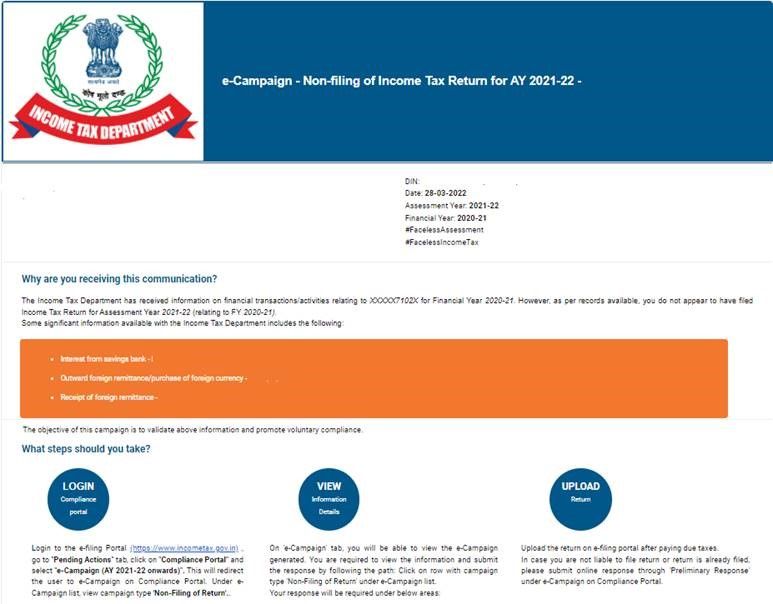
Dubai: Some UAE-based Indian expats have been mailed notices from the income tax department in India relating to their previous investments in India and ‘residential statuses’, and this has raised concern among non-resident Indians (NRIs) on what the next step should be if they get such notices.
Here’s what you should know when it comes to what needs to be done if you are a NRI and have received such a notice from the Indian income tax department, as it is vital to know how to respond to them given that there was some confusion around doing them last year as well.
What notices are being sent to these NRIs?
In their emailed notifications, the income tax department is particularly scrutinising the ‘residential’ status of NRIs and are sending them notices to assess or re-assess any taxable income or investments they have in India, which either have earlier been overlooked or missed from being disclosed.
The NRIs who got the email are also asked to re-assess the last five to six years of yearly disclosures or incomes tax returns (ITRs) that were filed on their investments in the country. The income tax department had earlier revealed that they started reopening old tax assessments with the help of a new algorithm, ‘INSIGHT’, a platform that filters through huge amounts of data.
This is in line with the outcome of the India Budget 2021, when the time limit to inspect income tax of NRIs was reduced to 3 years from 6 years. NRI taxes can be re-assessed even after 10 years when the income involved is more than Rs5 million (Dh242,402).
Why are such notices being sent to some NRIs?
With the new algorithm, the tax department can issue as many as 50,000 letters under ‘section 148A of the Income Tax Act, 1961’, which is a provision under which the government can assess tax disclosures of NRIs with investments in their home country.
Some NRIs have also got compliance emails pertaining to high-value transactions they have entered in India in the past. They have also been asked to share photocopies of their passports. These NRIs have also received an ‘e-compliance email’ with email subject lines ‘e-Campaign - non-filing of Income Tax Return (ITR)’.
These emails are received on the registered email-ID of the NRI or in this case, the assesse. The email contains something similar to below image in which they give you list of transactions or investments you have entered in India.

In case you have not registered your PAN, you can register the same on the https://www.incometaxindiaefiling.gov.in/home website and check the status of your PAN and see if you have been issued any notices. Normally, you will receive such communication over email, but in case your email-ID is not updated you can update the same on the Indian Income Tax website.
Can I ignore the notice and do nothing?
If you have received such a notice, you shouldn’t ignore them as it may trigger a lot of unnecessary consequences. In case you are required to respond to such notices, it is recommended that you do so after consulting your tax consultant, if you have one.
However, most of such notices are issued to NRIs who do not file their income tax returns in India, even though they have multiple investments or incomes in India. Now with all the new changes in the law it is recommended to file the returns regularly in India to avoid such notices in future.
10 benefits for NRIs filing tax returns in India
Here are certain useful and relevant points, which show the importance of filing Income Tax Returns (ITR) by the due date, which must be considered for the purposes of filing tax returns before the due date:
1. Getting a refund on Tax-Deducted at Source (TDS)
One of the most essential aspects of filing an ITR as an NRI is for availing the liable refunds on the TDS (or Tax Deducted at Source, which is tax deducted at source of income before paying the balance to the payee). An NRI has various bank accounts in India.
NRE account is freely repatriable (can be converted to any foreign currency), while the NRO account has restricted repatriability i.e permitted remittance allowed from NRO is up to $1 million (Dh3.67 million), which is net of applicable taxes in a financial year.
An NRO account is like your regular bank savings account but has certain restrictions. In this account you can deposit your rupee earnings from India such as rent, interest, dividends etc. You can also deposit funds from abroad that are in the form of freely convertible foreign currency. The funds in NRO account are usually from income earned locally, like rent on a property in India or certain capital account transactions like sale of property purchased prior to becoming an NRI.
FCNR stands for Foreign Currency Non Resident Account (Banks) Account Opening. This is a kind of fixed deposit account opened for depositing income earned overseas. The account is held in foreign currency. Interest earned on FCNR deposits is tax exempt as long as an individual qualifies as an NRI or not ordinarily resident. Hence, interest earned on FCNR deposits will be taxable in India.

Amongst these NRI bank accounts, the interest earned on the NRO Account is taxed at 30 per cent along with other charges. This tax is deducted on the format of TDS and is refundable as per the tax slab of the NRI. Again, NRIs invest in multiple asset classes in India and for each of these investments, TDS for NRI is a major tax instrument. There are liable refunds at many ends and filing an ITR is the only way to avail such refunds.
2. Claiming refund on taxes for overseas expats
NRIs are often stuck amidst the crevices of double taxation. There is a treaty called the Double Tax Avoidance Agreement (DTAA) that is signed between two countries enabling residents to avoid paying double taxes on the same source of income.
India has signed DTAA with 85-plus counties including the USA, UK and the UAE. Now, filing an ITR is the only way you can use this DTAA to either get a tax exemption in one of the countries or get the credit for the tax paid in India in your resident country.
3. Transfer of money from your NRI bank accounts
The transfer of money from your NRI Bank Accounts to your overseas bank accounts is called ‘repatriation’. Now, both NRE and FCNR are completely and freely repatriable for an NRI as these accounts hold your foreign income.
However, for repatriation from the NRO Account (the account that holds your income generated in India) you need to furnish certain forms (namely ‘15CA and 15CB’), but this process needs the involvement of a Chartered Accountant (CA). If you have your ITR filed, the entire process of repatriation becomes smooth and convenient.
4. When getting loans sanctioned for NRIs
As an NRI, specifically when it comes to retirement planning, there can be a need for a personal loan or home loan in India. The basic documentation requirements for such endeavours involve the Income Tax Return. The ITR is an essential document for the banks or firms to validate your residential status and financial transactions in order to go ahead with the sanctioning of loans.
5. Claiming certain tax deductions for NRIs
There are tax deductions available for NRIs up to Rs150,000 (Dh7,264) under the section ‘80C’ of the Indian Income Tax Act. The section involves around 20-25 different asset classes (premium paid for life insurance, investments in certain investment schemes, term deposits, pension schemes, etc.) where deductions can be availed, but not all these deductions are applicable for an NRI. But there are some asset classes where deductions can be claimed as an NRI and filing an ITR is the only way to do that.

6. Avoid notice from the income tax department
Not filing an ITR when you need to can lead to situations where you might receive a notice from the income tax department. Your tax records make it easy for the income tax department to assess whether you have filed your returns or not. Filing an ITR as an NRI enables you to avoid notices or scrutiny from the IT department along with creating a good track record with no enquiries or penalties (late fine, non-filing etc.) under your name.
7. Carry forward of losses made during investing in India
As an NRI, if you have incurred a loss in any category (it may be in your business or a loss after selling of property, mutual funds etc.) then you can carry it forward to the next year under the provisions of the Indian income tax norm to set it off against profits in the future. But, if you fail to file your ITR before the due date then you won’t be able to carry forward the losses of the year. Many NRIs think that if they are incurring a loss, then filing an ITR isn’t important which takes away the chance to redeem the loss next year as non-filing results in the lapse of loss.
8. Reporting residential status and financial transactions
The ITR serves as a proof of residential status and your financial transactions for a particular financial year. It is on the basis of the ITR, that your status is verified so that you can enjoy the benefits of your residential status.
9. Tax deductions under other sections of the income tax
Apart from section 80C, like mentioned above, there are other sections where deductions can be claimed by an NRI. Sections like 80D, 80G, 80E, and 80U are some of them, which comprises of tax deduction benefits for payments made towards life insurance policies, fixed deposits, provident funds, construction or purchase of residential properties.
Also, NRIs are allowed to claim tax exemption under section 54, section 54EC and section 54F, which pertain to long-term capital gains. For claiming such deductions filing an ITR is necessary.
Long-term capital gains are those from the sale of assets you've held for longer than a year are known as long-term capital gains, and they are typically taxed at lower rates than short-term gains and ordinary income, depending on your taxable income.
10. ITR acts as a valid legal document for various purposes
An ITR can be used as an income or address proof in India. Apart from that, it has multiple uses which include sanctioning of loans, visa processing, etc. It serves a great aid while repatriating funds abroad and is one of the most important documents you should possess if you are having a source of income in India above the basic exemption limit of Rs250,000 (Dh12,107).









